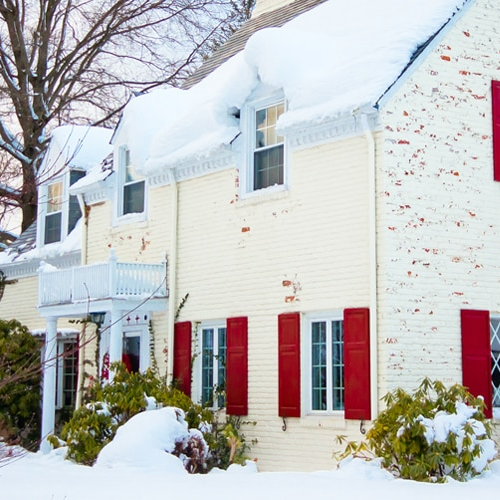Interest rate vs. home price: Which matters more?
Apr 12, 2024
•5-minute read

When making a home purchase, most buyers will focus primarily on interest rate and home price. The latter is the principal amount you pay for the house, while the former is the amount you’re charged to take out a mortgage and pay over time as part of your monthly mortgage payment. Both play an important role in determining whether it’s a good time to buy and the type of house you can afford.
But when considering interest rate and home price, does one matter more than the other? Let’s look at how the two actually work together – along with some considerations to keep in mind as you’re house hunting.
Do interest rates affect house prices?
Interest rates do affect house prices, and the two typically have an inverse relationship. When the Federal Reserve raises interest rates, home buyers can’t afford expensive houses, so the prices will start to drop.
And the reverse is also true – when mortgage rates are low, buyers have more money to spend, so home prices will start to rise. However, the housing market is constantly changing, so this is more of a guideline than a hard rule.
As interest rates rise, home prices don’t always drop as quickly or as significantly as anticipated, though. This makes the relationship between interest rates and home prices less distinct.
Interest rates vs. home prices historical chart
The COVID-19 pandemic caused interest rates to drop to historic lows, but rates didn’t stay that low. Mortgage rates have since gradually increased, but when you consider interest rates from a historical perspective, you’ll see that rates are still low by comparison. This means it’s not necessarily best to rely on interest rates alone to determine whether buying a home is a good investment.
The following chart provides an overview of mortgage rates and the median sales price of homes in March each decade since 1972. This information is based on data from Freddie Mac, the census, and the Department of Housing and Urban Development.
| Year | Rates | Median sales price |
|---|---|---|
|
March 1972 |
7.23% |
$26,200 |
|
March 1982 |
17.12% |
$66,400 |
|
March 1992 |
9.03% |
$119,500 |
|
March 2002 |
7.14% |
$188,700 |
|
March 2012 |
4.08% |
$238,400 |
|
March 2022 |
4.42% |
$408,100 (Q4 2021) |
|
End of March 2023 |
6.32% |
$436,800 |
How are home buyers impacted by interest rates and house prices?
Both interest rates and house prices impact home buyers, particularly first-time home buyers. If the interest rates or housing prices are especially high, first-time buyers may be hesitant or unable to enter the market.
That’s why it’s essential to do your research and ensure it’s the right time for you to buy before taking action. In particular, home prices and interest rates impact two key financial components of the mortgage process: the amount you use for your down payment and how much you’ll pay on your mortgage each month.
Down payment
In the real estate industry, the gold standard (to avoid private mortgage insurance on a conventional loan) is to put down a 20% down payment when you’re buying a home. That means if you’re buying a $300,000 house, you’ll make a down payment of $60,000. As house prices start to rise, your required down payment will go up as well.
Of course, many people can’t afford to make a 20% down payment. Some lenders will accept a down payment as low as 3% or even 0% depending on the type of loan, but a lower down payment can mean a higher interest rate.
Monthly payment
The home price, your down payment and interest rate will affect the amount of your monthly mortgage payment. If you buy a more expensive house, your monthly payment will be higher. And a higher interest rate will cause your monthly payment to go up as well.
Home prices vs. interest rates: which is more important?
So, which is more important – the home price or your interest rate? It depends, but the best way to see how the relationship works is by looking at a few scenarios, which we’ll walk through next.
Scenario 1: Lower interest rate
Let’s consider a scenario where a buyer opts for a lower interest rate and higher home price. Because the interest rate is lower, the buyer can afford to buy a bigger house, which they probably assume will appreciate in value.
They purchase a $400,000 home and put down a 10% down payment. The loan term is 30 years, and their interest rate is 3.25%. Not counting homeowners insurance and taxes, their monthly payment will be $1,566.74.
Scenario 2: Lower house price
In another scenario, the buyer prioritizes a lower home price and purchases a $300,000 house instead. By buying a lower-priced home, they’ll be able to build equity faster, which will allow them to refinance more easily.
And when you run the numbers, their monthly payments are considerably lower. Keeping all other factors the same, their monthly mortgage payment will be $1,175.06. That’s a monthly difference of $391.68.
Of course, lower prices may only come as a result of higher interest rates, so while we’ve kept the rate constant for the purposes of comparison, it will be important to run the numbers yourself based on what’s happening in your market.
Interest rates vs. house prices: FAQs
A clear relationship exists between interest rates and home prices, but fully comprehending that relationship can be a little challenging at first. Here are answers to a few frequently asked questions so you can better understand how interest rates impact home prices and vice versa.
Do higher home prices mean interest rates are lower?
Not always. Every real estate market is different, and that means prices may be higher in your area even if mortgage rates are high. However, if you look at historical trends, higher home prices do tend to correlate with lower interest rates because more people are looking to buy homes when mortgage rates are low.
Can I do anything to increase my chances of getting a lower interest rate?
Check your credit score often. If it’s low, focus on paying off your existing debts and make on-time payments on those debts each month. You may also want to build your savings to increase the size of your down payment. A higher down payment shows a lender you’re serious about buying the home, and many lenders will offer a better interest rate to borrowers making a larger down payment.
Should I buy a house when interest rates are high?
It depends on your personal situation. If you’re comfortable with the amount of money you’ll pay on a mortgage with a higher interest rate, buying may be a good choice. Consider your finances before making a decision and only buy a home if you’re sure you can afford it.
The bottom line
The ideal scenario is to buy a home when both interest rates and home prices are low, but that isn’t always possible. So, as you’re considering the relationship between home prices and interest rates, keep in mind that prioritizing one over the other isn’t necessarily a good idea.
Ultimately, your buying decision should come down to your financial situation and your goals and priorities as a buyer. Are you focused on buying a bigger home, or is your goal to keep your monthly payment as low as possible? If you buy a home with a high interest rate or a high listing price, make sure you run the numbers so you understand the short-term and long-term financial implications.
Once you’ve reviewed your finances, you’ll be ready to make the right decision for your needs.
Ready to buy a home? Apply online or give us a call at (833) 326-6018.

Jamie Johnson
Jamie Johnson is a Kansas City-based freelance writer who writes about a variety of personal finance topics, including loans, building credit, and paying down debt. She currently writes for clients like the U.S. Chamber of Commerce, Business Insider, and Bankrate.
Related resources

10-minute read
When is the best time of year to buy a house?
Wondering about the best time of year to buy a house? We’ve broken down the most important factors to consider, including the season, weather, and price.
Read more
11-minute read
Is now a good time to buy a house?
Are you wondering if now is a good time to buy a house? Learn about the various market and personal factors you should consider to make an informed decision....
Read more

8-minute read
How are mortgage rates determined?
Discover what determines interest rates with our in-depth analysis. Explore how economic trends, credit scores, and more impact mortgage rate decisions.
Read more